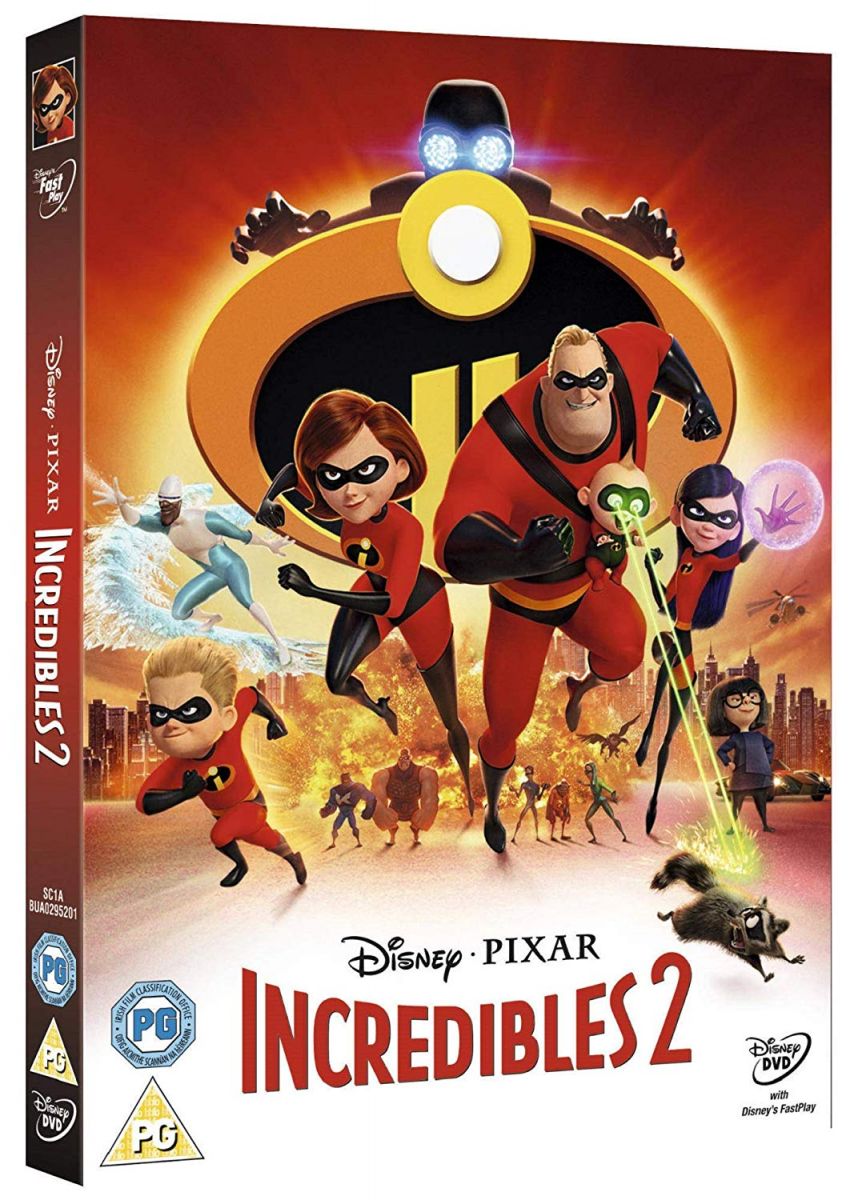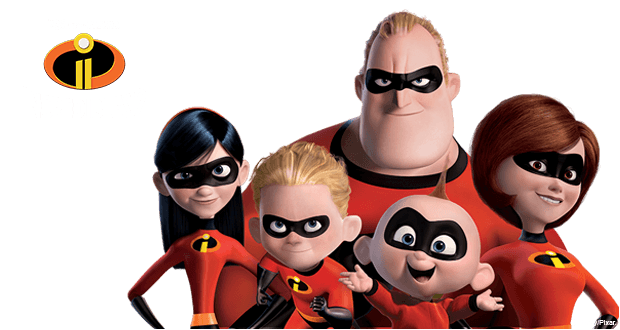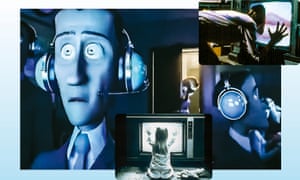 Film title: Incredibles 2
Film title: Incredibles 2
Year of Release: 2018
Director: Brad Bird
Certificate: PG
Running time: 1 hour 57 minutes
'Incredibles 2’ follows the life with the Parr family as Helen (Elastigirl) becomes the face of a new campaign to make superheroes legal again, while Bob (Mr. Incredible) is left to run the family home.
At the start of the film, the family is staying in a motel to keep a low profile, because superheroes are still illegal. Things aren’t going so well – the family is unsuccessful in trying to stop a villain and are arrested as a result.
However, there is a glimmer of hope when the family is approached by Winston and Evelyn Deaver, owners of Devtech, who want to help superheroes become legal again. They choose Elastigirl (Helen) to help. As she’s out on missions and multiple TV appearances, Bob (Mr. Incredible) is left in charge at home.
Both Helen and Bob have obstacles to overcome. A new villain, Screenslaver, starts interrupting Helen’s campaign efforts, so she sets about identifying and catching him. Mr. Incredible, meanwhile, is learning about Jack-Jack’s emerging array of powers, while helping Dash with his homework, sorting out Violet’s boy troubles and generally keeping things together while his wife is away. When the situation at Devtech takes a dangerous turn, the family unites to defeat wicked Screenslaver.
Sometimes young people find it hard to contribute to a group discussion. They may feel shy, or that their contribution might appear silly. The first part of the session is, therefore, a chance for young people to think about the film and begin to develop a reaction to what they have seen in a way that everyone will have something to contribute. These are some simple, quick exercises to get everyone thinking about their reaction to the film.
When Helen is assigned to her new role, the Incredibles are invited to stay in a high-tech, luxury mansion owned by Devtech. In pairs or small groups, invite the young people to design their own ‘dream homes’. Give each group some paper, pens and maybe some home magazines and catalogues that they can use as inspiration. Then ask the groups to share their dream homes, and award a prize to the group with the most creative ideas.
Ask the group, out of all the main characters in the film, who would you choose to help you in a crisis? Who would be the least helpful in a crisis?
The film covers a range of themes that young people would connect with, including perception, family, significance, use of screens, and celebrating differences. This section gives the young people a chance to explore these issues in more depth.
In the world of the film, superheroes have been banned because the perception is that they cause destruction. Mr. Incredible, Elastagirl and Frozone are invited to the Devtech headquarters to meet Wilson Deavor. He is keen to change people’s perceptions of Superheroes.
Watch the clip
Starts: 0:19:00
End: 0:20:17
Length: 1 minute 17 seconds
In the clip, Wilson tells the superheroes that people only see what politicians want them to see. Ask the group, do you think this is true of the news in real life? Why, or why not? Then ask them to think about situations from the news which could be compared to this fictional situation with superheroes – where one perspective is broadcasted more than others. If your group is interested in politics, you may wish to open up a discussion about the Brexit referendum back in 2016 (if you dare!).
You could also discuss perceptions about Christianity. What wrong perceptions do people have about God because of the way Christians behave? How does the media portray Christians?
Key question: How can Christians help people to have a positive perception of God or Christianity?
You may want to look at the following scriptures to aid your discussion:
There are many clips throughout the film that represent family, but the following clip shows the Incredibles family finally coming together after a long time apart. The children come to save their parents from Screenslaver, and although they were breaking the rules by leaving the house. It was once the family started working together that the villain was defeated.
 Watch the clip:
Watch the clip:
Starts: 1:34:24
Ends: 1:36:02
Length of clip: 1 minute 38 seconds
Ask the group to share some happy memories involving their families – maybe it was a great family holiday, a new sibling is born, or having Christmas together.
Encourage the group to think about memories with people that they consider to be family, even though they may not be related. Frozone is like an uncle to the Incredibles kids – we all have people in our lives that are more like family, than friends. Make sure that everyone has had a chance to share something about how family looks for them. Highlight to the group that each family is unique.
Key question: Why are families important?
Families go through life together, through the good times and the not so good times. They can support each other, celebrating success and supporting when things get difficult.
Then the LORD God said, "It is not good for the man to be alone. I will make a helper who is just right for him." Genesis 2:18 (NLT)
Read this verse to the group and discuss what they think it means in relation to family life. What can we learn about what God thinks about loneliness, and about living in community?
Mr Incredible is so frustrated when his wife is chosen to represent superheroes instead of him, that he starts to resent her.
Watch the clip:
Starts: 0:40:00
Ends: 0:41:41
Total clip length: 1 minutes 41 secs
Key question: Why can’t Mr. Incredible be happy for Elastigirl when she tells him about her mission?
Encourage the group to think about how Mr. Incredible finds his sense of significance in his superhero identity. He can’t bear to see his wife take all the glory because he thinks he should be there instead.
Key question: Where do we find significance?
Encourage the group to think, first generally and then personally, about significance (you could also present it as ‘security’). A footballer may find their significance in their ability to shoot a penalty, or a business owner could find their significance in how much profit they make. We could even find our significance by being in a relationship or a friend we admire. The trouble with placing our security in things is that they can change or break. Our sense of security is compromised and we can end up feeling like we are not significant.
Explain to the group that if we find our security or our sense of significance in Jesus and what he has done for us, we are truly significant and secure because He never changes, and He’ll never leave us.
To explore this further, you may want to explore the following verses from the Bible which show us how significant we are in God’s eyes:
Matthew 18:12
Mathew 10:29-31
Psalm 34:17-20
Psalm 139:13-16
The villain in the film goes by the name, ‘Screenslaver’, and seems to make a cultural comment about screen addition and consumerism by controlling his victims through screens.

Watch the clip:
Starts: 0:56:43
Ends: 0:58:43
Total clip length: 2 minutes
After you’ve watched the clip, ask the group if they can remember anything from the Screenslaver’s speech as Elastigirl searches for him. You may want to rewind the clip and watch it again.
Read out the following quote from the speech, and ask the group, do you agree that screens can have this effect on us?
“Every meaningful experience must be packaged and delivered to you to watch at a distance, so that you can remain ever sheltered, ever passive, ever-ravenous consumers that can’t bring themselves to rise from their couches, break a sweat and participate in life.”
It’s certainly true that screens can be addictive, particularly social media and video games. Do these things prevent us from participating in life? After some discussion, finish by asking the key question:
Key question: How can we make sure that we stay in control of our use of screens, rather than letting screens control us?
When Mr. Incredible is left at home to look after the children, he discovers that baby Jack-Jack has an infinite number of superpowers that enable him to pass through walls, burst into flames, shoot laser beams from his eyes and turn into a demon-baby. Mr. Incredible is excited at first until he realises that Jack-Jack can do dangerous and life-threatening things without thought. He goes to his suit designer, Edna, for help.
Watch the clips
The first clip starts: 1:07:49
The first clip ends: 1:09:12
Total length: 1 minute 23 seconds
The second clip starts: 1:15:02
The second clip ends: 1:17:59
Total length: 2 minutes 57 seconds
Ask the group, what are the differences between Mr Incredible and Edna’s reaction to Jack-Jack’s powers? Mr. Incredible sees them as a danger to Jack-Jack, whereas Edna sees the baby’s potential. Discuss the reasons for their different reactions. Perhaps Mr Incredible was afraid of the unknown because his other two children just have one or two superpowers. Edna, on the other hand, is a designer and can think of creative ways to help Jack-Jack control his powers.
Key question: We all have different skills and abilities – in what ways can we help and encourage people with needs and skills that are different to ours?
If you want to explore an example of celebrating people’s differences in the Bible, you could turn to Nehemiah 3 and show the group how many different people worked together to rebuild the walls of Jerusalem. Everybody had their own piece of the wall to build that required a skill that perhaps only they knew how to do. Nehemiah must have known where everybody was best placed to make sure the wall was completed.
The third part of the session is a chance to compare the story of the film with a story in the Bible. What are the similarities and differences, and what does this tell us about God’s Kingdom?
Young people may not grasp all the theological points that could be made, but it’s important for them to begin to get used to the idea of critiquing what they see and holding it against the values and beliefs of the Christian faith.
Some of this reflection may come from an open discussion and as seen above, there are many themes and directions that this could take.
“There are different kinds of spiritual gifts, but the same Spirit is the source of them all. There are different kinds of service, but we serve the same Lord. 6 God works in different ways, but it is the same God who does the work in all of us.” 1 Corinthians 12:4-6 (NLT)
The Incredibles family each have different superpowers, but when they work together, they are a force to be reckoned with! It is the same with our church family – if we know Jesus, we each have been given different gifts from the Holy Spirit. When we put these gifts together, it makes the church very effective for encouraging each other and representing Jesus to those around us.
You may want to spend some time with your group exploring Spiritual Gifts together. Depending on where your young people are on their discipleship journeys, they may have heard about Spiritual Gifts but may not know what they are, or which ones God has given them.
For young people who haven’t been to church before, you could use this as an opportunity to explore with them what church really means – it’s not a building where Christians go, but it’s a word that defines who Christians are when they all work together.
Here are the different passages which list the different gifts of the Spirit:
Romans 12:6–8
1 Corinthians 12:4–11
1 Corinthians 12:28
Here are some ways you could explore the gifts with your group:
Read through each gift and define what they mean, giving examples of how they can be used to encourage and build people up
Debunk some of the myths surrounding some of the gifts, that are relevant to your group. For example, prophecy is not about fortune telling and it’s not about speaking the direct words of God. ‘Administration’ isn’t a lesser gift, it’s just as important as the others and can be quite creative.
Encourage the group to identify each other’s spiritual gifts. Have a time of prayer and encouragement, celebrating the different gifts within the group.
Invite some of the leaders to share how they found out what their gifts are, and how they are using them.
If you have young people that have not made a commitment to Jesus or are at the beginning of their discipleship journey, you could approach these passages by exploring how your group could work together to do something positive. For example, you could put on a talent show highlighting the different skills within the group.